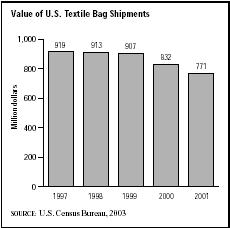SIC 2393
TEXTILE BAGS
This category includes establishments primarily engaged in manufacturing shipping and other industrial bags from purchased fabrics. Establishments primarily engaged in manufacturing plastic bags are classified under SIC 2673: Plastics, Foil, and Coated Paper Bags; those manufacturing laundry, wardrobe, shoe, and other textile house furnishing bags are classified under SIC 2392: House Furnishings, Except Curtains and Draperies; and those manufacturing luggage are classified under SIC 3161: Luggage.
NAICS Code(s)
314911 (Textile Bag Mills)

In the early 2000s, more than 400 textile bag mills operated in the United States, according to the U.S. Census Bureau. Roughly 10 percent made house furnishings, while the remaining 90 percent manufactured primarily textile bags (excluding bags for laundry, wardrobes, and shoes). Those establishments spent $433 million on materials, parts, containers, resales, fuels, electricity, and contract work. Their capital expenditures for new and used buildings, other structures, machinery, and equipment were $21 million. About one-third of all textile bag mills had at least 20 employees. Less than 30 had more than 100 employees. The greatest concentration of establishments in this category was in California, New York, Texas, and Washington. The highest concentration of the larger firms was in California.
The value of shipments for textile bags decreased steadily throughout the late 1990s and early 2000s. The value of shipments of all products in this industry declined from $919 million in 1997, to $907 million in 1999, and to $771 million in 2001. This downward trend reflected an overall decline in the textiles industry, largely the result of weak economic conditions in the United States, coupled with increasingly fierce competition from imports.
Kansas City, Missouri-based BHA Group Holdings Inc. led the category with sales of $181 million in 2003. Other firms that made textile bags as their primary business included MFRI Inc. of Niles, Illinois, with 2003 sales of $122.9 million; Super Sack Manufacturing Corp. of Savoy, Texas, with sales of $55 million; Cady Industries Inc. of Pearson, Georgia, with sales of $50 million; Menardi-Criswell of Trenton, South Carolina, with sales of $30 million; Bulk Lift International Inc. of Carpentersville, Illinois, with sales of $22 million; and Kenneth Fox Supply Co. of McAllen, Texas, with sales of $17 million.
This industry classification had an estimated 10,636 employees in 2000, down from 14,089 in 1997. The industry's 8,792 production workers earned an average hourly wage of $12.64 in 2002. Total payroll in the segment was $221.8 million, down from $253.5 million in 1997.
In 1994 the United States, Mexico, and Canada implemented the North American Free Trade Agreement (NAFTA), a pact to gradually remove all tariffs and other trade restrictions from most goods made and sold in North America. Although this boosted U.S. textile exports to Mexico from $1.1 billion to more than $3 billion between 1995 and 2002, textile industries continued to struggle with increased imports. The World Trade Organization Agreement on Textiles and Clothing, which phased out quotas by 2005, was expected to cost the United States $4 billion in lost textile sales, according to the American Textile Manufacturers Institute. The largest threat would come from China, which imported $9.8 billion worth of apparel and fabricated textile products in 2002.
Further Reading
U.S. Census Bureau. "Statistics for Industry Groups and Industries: 2000." February 2002. Available from http://www.census.gov/prod/2002pubs/m00as-1.pdf .
——. "Value of Shipment for Product Classes: 2001 and Earlier Years." December 2002. Available from http://www.census.gov/prod/2003pubs/m01as-2.pdf .
U.S. Department of Agriculture. "NAFTA: A Clear Success for U.S. and Mexican Textile and Cotton Trade." January 2004. Available from http://www.fas.usda.gov/info/agexporter/2004/January/pgs%2022-23.pdf .
Comment about this article, ask questions, or add new information about this topic: